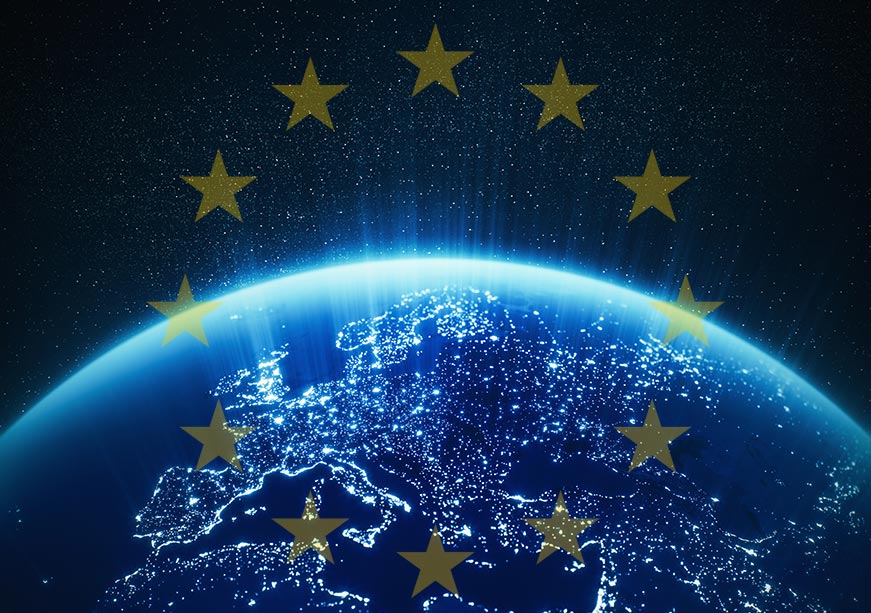-
CENTRES
Progammes & Centres
Location
As Europe grapples with an existential crisis on multiple fronts, it also stands at risk of losing its autonomy and competitiveness in the space sector

Image Source: Getty
The return of US President Donald Trump with a strong mandate has sent tremors through several sectors, including the global space industry. President Trump’s electoral campaign and his forthcoming presidential tenure will cast a long shadow over the astropolitical landscape. That shadow is Elon Musk, like Trump, has started to target socialist governments in Europe, particularly the United Kingdom, Denmark, and Germany, while also putting their support behind their favoured leaders. These power plays in left-right partisan politics are far from superficial. A significant separation of trans-Atlantic technology cooperation is on the horizon, and this has become a bipartisan understanding.
The crisis of native fertility rates, consistently high illegal immigration, a fragile economic forecast, a decline in technological competitiveness, the high cost of energy, and the fight to preserve Europe’s cultural identity.
Europe is seeking political autonomy. This realisation has come as Europe faces an existential crisis. The crisis of native fertility rates, consistently high illegal immigration, a fragile economic forecast, a decline in technological competitiveness, the high cost of energy, and the fight to preserve Europe’s cultural identity. Moreover, with President Trump at the helm, all North Atlantic Treaty Organization (NATO) members are being called to increase their defence spending to 5 percent of their respective GDPs. Europe realises that, hereafter, it will have to be responsible for its security. A good omen for Europe, Trump’s call led to a surge in stock prices of European defence contractors.
Europe’s relentless push to expand NATO far beyond the Atlantic has done it no favours. The Russia-Ukraine war came at the peril of European space ambitions. While the motive was to cancel Russia, Europe terminated lucrative business contracts for the launch of its OneWeb satellite constellation. India and the US both benefited from this. The European Space Agency delayed its ExoMars mission, which was to be launched on Russia’s Soyuz vehicle. All kinds of space cooperation with Russia were shunned. Of course, Russia was affected, but the cancellation has boomeranged on Europe, particularly France, Germany, Italy, Spain, and the Netherlands, which have the highest space sector industry employments in Europe in the same order. Of these countries, the French, Italian and German space ecosystems have been particularly affected, as the European commercial space market, at US$ 38 billion, has been relegated to number 3, after the Asian (US$ 45 billion) and American markets (US$ 86 billion). It faces a cathartic crisis today—on the verge of losing its autonomy and competitiveness in the space domain.
The European Space Agency delayed its ExoMars mission, which was to be launched on Russia’s Soyuz vehicle. All kinds of space cooperation with Russia were shunned.
Euro-centric advocates, including famed astronaut Thomas Pesquet, have been expressing concerns about the loss of Europe’s space autonomy for the past few years. The concerns are valid, as the European space ecosystem is increasingly dependent on the US and, by a large margin, losing to the US. The European Council, in May 2024, added to the existing EU Space Programme 2021-27 the ‘Council Conclusions on Strengthening Europe’s Competitiveness through Space’ with the intent of resuscitating Europe’s economy, its ability to self-secure itself, and ensuring a competitive technological, financial and talent resource of native European origins. However, this is easier said than done; Europe has an arduous road ahead.
EUMETSAT, a major commercial operator of meteorological satellites, had no time to wait for the under-development French Ariane-6 launch vehicle, as it went to SpaceX for its launch needs. This raised genuine consternation in Brussels, where French Member of the European Parliament, Christophe Grudler, echoed that if European space entities do not apply a strict European preference for satellite and spacecraft launches, then Europe must forego thousands of jobs in the space sector and its ‘strategic autonomy.’
It doesn’t stop there. EU member states are currently stuck in a dilemma regarding SpaceX’s Starlink services. Starlink is commercially available for public use in many EU member states. Still, most member states are increasingly finding it difficult to choose between secure Starlink services for governmental and military usage and Europe’s indigenous secure-network IRIS2 satellite constellation, which would come up only in the early 2030s and, at present, is facing cost escalations. This dilemma has again reignited the issue of how difficult it is for EU members to work on space autonomy collectively. The call for autonomy is not a reaction to Russian, Chinese, or even Indian competitiveness. It is solely directed towards Europe’s growing dependence and falling behind the US. This falling behind is not restricted to EU or national projects but is also visible in the commercial space ecosystem.
The call for autonomy is not a reaction to Russian, Chinese, or even Indian competitiveness. It is solely directed towards Europe’s growing dependence and falling behind the US.
Not only IRIS2 but also European efforts to establish a satellite mega-constellation are faltering. Achieving last-mile connectivity, both on land and over oceans, has become a goal for superpowers. Maintaining constant connectivity to critical installations on remote islands in the Arctic, Atlantic, and Indo-Pacific during natural disasters or geopolitical events is a target vigorously pursued by both China and the US. In 2024, China initiated the launch of the Qianfan and Guowang satellites, which are part of two distinct constellations. Guowang features 13000 satellites, while Qianfan has 15000 satellites planned within their respective constellations. Beijing claims that both of its constellations are designed to compete with the US’s Starlink constellation, which intends to deploy around 42,000 satellites.
The Low Earth Orbit (LEO) satellite constellation race between the US and China consists of two tiers. The first tier involves fully occupying all possible orbital slots allocated to them and through third countries. The second tier focuses on developing manufacturing capabilities that align with the International Telecommunications Union’s requirement of launching 10 percent of the constellation within two years of the ITU filing, 50 percent within five years, and 100 percent of the satellites within seven years.
France, which boasts the largest exclusive economic zone and numerous islands in the Atlantic and Indo-Pacific, has also submitted a request to the ITU for a significant constellation called Semaphore-C, made up of 116,640 satellites. However, unlike the active launch schedules of the US and China, the European space launch capacity has diminished. Currently, it depends on the small launcher, Vega-C. Although its Ariane-6 is nearly ready for commercial launches, it will have to earn the cost-effectiveness tag. The next-generation reusable launcher, Ariane Next, remains in the development stages.
The Sino-American satellite constellation race has assumed that less capable countries are willing to sacrifice their strategic autonomy over satellite internet, now regarded as critical infrastructure, and become dependent on these powers.
Europe finds itself significantly behind the US in terms of venture capital raised. While the US commercial space ecosystem raised US$ 6.8 billion in 2023, the European ecosystem lagged, with investments totalling US$ 1.4 billion. The primary concern is that Europe is cornering itself without options, as no other non-US sources of venture capital are accessible to its startups, especially for financing technologies transitioning from demonstration to commercialisation.
The Sino-American satellite constellation race has assumed that less capable countries are willing to sacrifice their strategic autonomy over satellite internet, now regarded as critical infrastructure, and become dependent on these powers. This assumption was met with initial success, but now, Europe’s call for autonomy will consolidate EU members and make other countries contemplate their autonomy. This may appear to be a strain in EU-US relations, but the bilateral relationship is about to become transactional, with President Trump in power, accompanied by Musk. This was inevitable and, given the new power equation, suits the preferences of both sides of the Atlantic.
Chaitanya Giri is a Fellow with the Centre for Security, Strategy and Technology at the Observer Research Foundation
The views expressed above belong to the author(s). ORF research and analyses now available on Telegram! Click here to access our curated content — blogs, longforms and interviews.

Dr. Chaitanya Giri is a Fellow at ORF’s Centre for Security, Strategy and Technology. His work focuses on India’s space ecosystem and its interlinkages with ...
Read More +